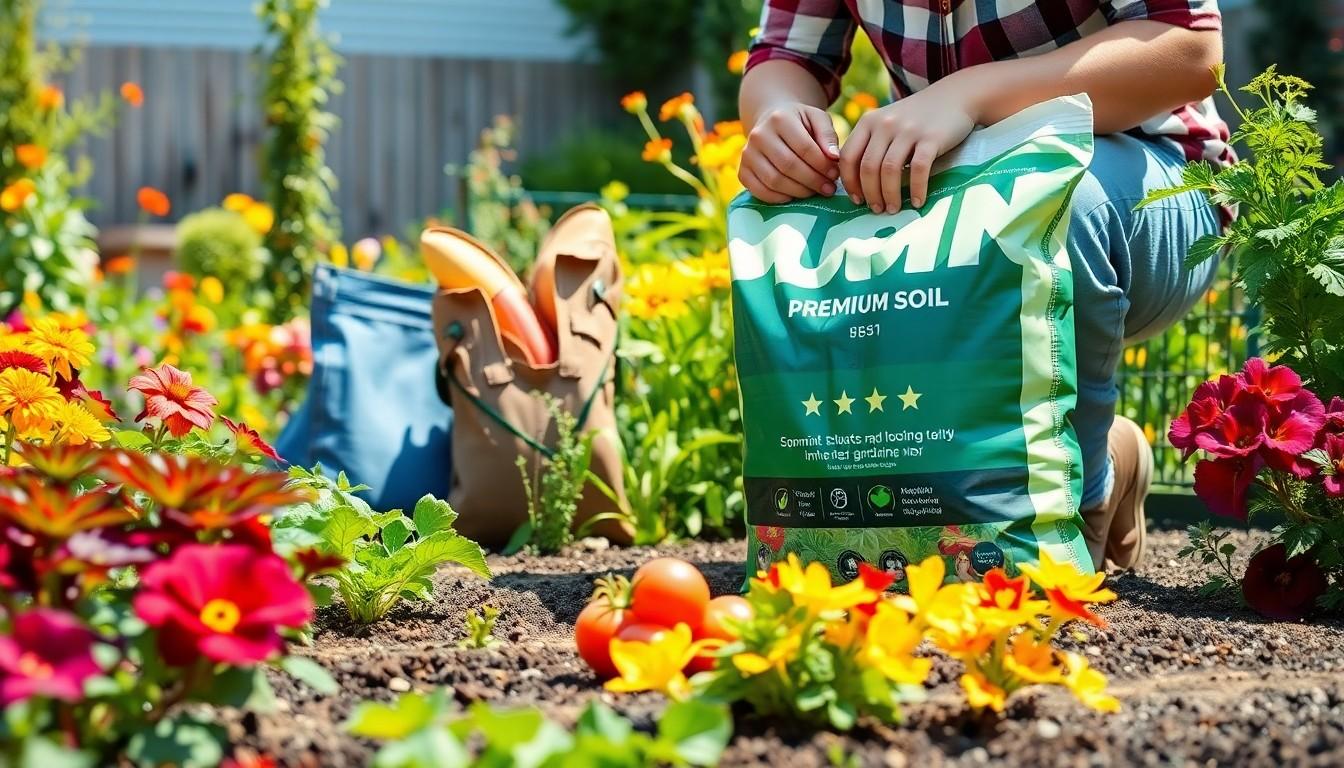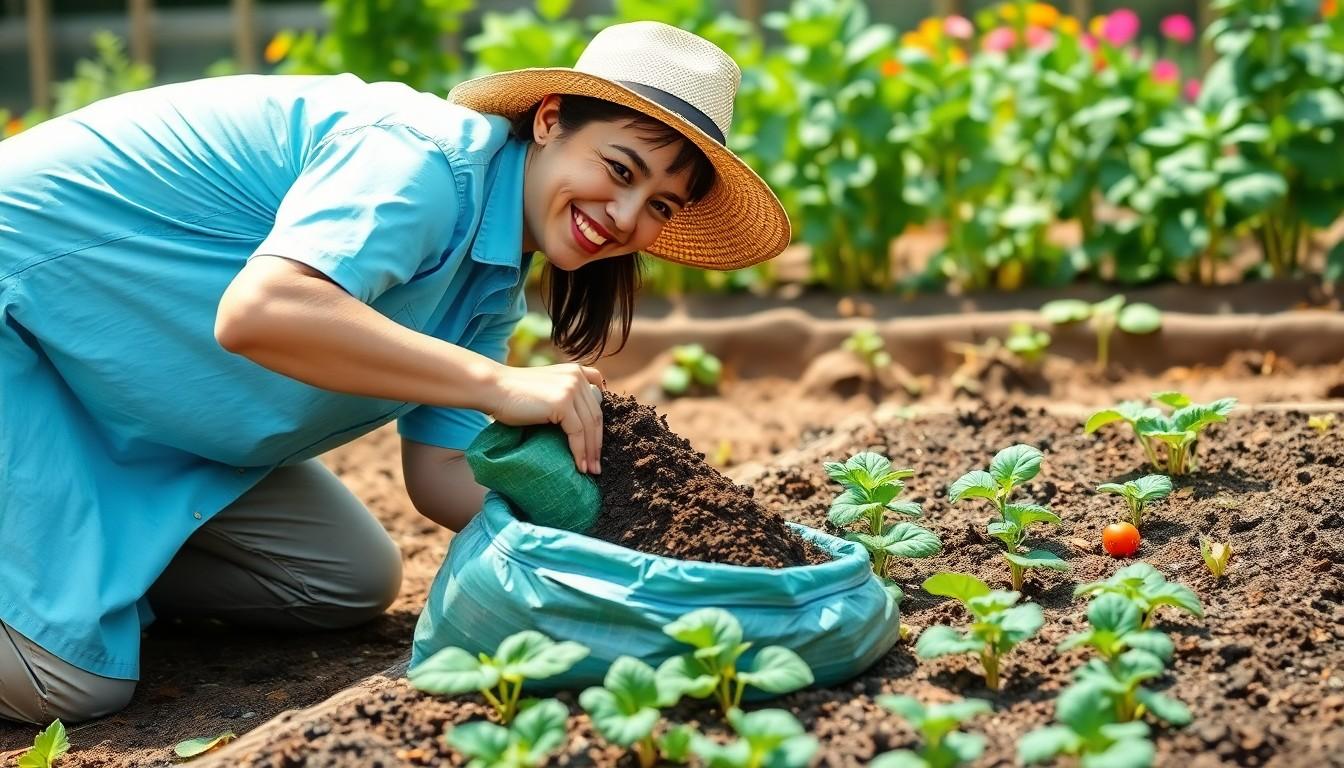Growing a vegetable garden can feel like a magical journey, but without the right soil, it’s more like a trip to the grocery store with a flat tire. The secret to thriving veggies lies beneath the surface, and choosing the best bagged soil can make all the difference. Imagine your tomatoes strutting their stuff like they just walked off a magazine cover—now that’s a sight to behold!
Understanding Bagged Soil
Bagged soil serves as a vital component for successful vegetable gardening. It contains a blend of essential ingredients designed to provide optimal conditions for plant growth. Each bag varies in its formulation, which can influence the health and productivity of vegetables.
Common ingredients in bagged soil include organic matter, peat moss, and compost. Organic matter enhances soil structure and nutrient content, while peat moss improves moisture retention. Compost supplies necessary nutrients that promote robust plant development.
Selecting the right bagged soil requires consideration of specific vegetable needs. For instance, tomatoes benefit from nutrient-rich mixtures that support vigorous growth. A gardener should consider pH levels, drainage capacity, and texture when choosing soil.
Not all bagged soils are created equal. Some options focus on moisture retention, ideal for vegetables needing consistent hydration. Conversely, others might emphasize drainage for root vegetables like carrots that thrive in well-draining environments.
Understanding packaging labels aids in making an informed choice. Labels often indicate whether a soil mix contains fertilizers or is organic. Thus, reading the label provides clarity on what to expect regarding nutrient content and overall quality.
Utilizing high-quality bagged soil contributes to a thriving vegetable garden. It ensures that each plant receives the necessary nutrients, leading to bountiful harvests. As a result, gardeners enjoy vibrant, healthy vegetables that flourish in their carefully chosen environment.
Benefits of Using Bagged Soil

Bagged soil offers numerous advantages for vegetable gardening. It provides essential nutrients and supports healthy plant growth.
Convenience and Accessibility
Bagged soil simplifies the gardening process. Many companies offer ready-to-use mixes available at local garden centers. Gardeners can easily transport bags, making it practical for various gardening locations. There’s no need for complex soil blending or extensive preparation. Typically, a wide range of formulations exists to cater to specific plant needs. Those who lack access to high-quality native soil can still grow a successful garden by using bagged soil.
Consistency in Quality
Quality consistency is another significant benefit of bagged soil. Manufacturers adhere to standardized recipes, ensuring uniform nutrient levels. This reliability minimizes variability that can occur with homemade soil mixes. Gardeners can trust that each bag stores a blend of ingredients that supports robust plant life. Testing for pH levels, organic content, and nutrient density enhances accountability. Consequently, bagged soil makes it easier to achieve the desired growing conditions over time.
Features to Look for in the Best Bagged Soil for Vegetable Garden
Selecting the right bagged soil involves understanding its key features. Gardeners should consider the following aspects when choosing soil for healthy vegetable growth.
Nutrient Content
Nutrient content plays a vital role in fostering plant growth. Look for a blend rich in essential nutrients like nitrogen, phosphorus, and potassium, as these support robust development. It’s beneficial to choose soil that contains organic matter, which enhances nutrient availability. Soil with added fertilizers may also provide an immediate nutrient boost. Checking packaging labels reveals specific nutrient breakdowns, helping gardeners make informed decisions. For optimal results, select soil with balanced nutrient content tailored to particular vegetables.
Drainage and Aeration
Drainage and aeration contribute significantly to root health. Effective drainage prevents waterlogging, reducing the risk of root rot while allowing excess moisture to escape. Look for soil with a loose texture to promote airflow, enabling roots to breathe. A good bagged soil mix often includes perlite or vermiculite, enhancing drainage and aeration. Soil that retains adequate moisture while allowing excess to flow freely satisfies the needs of various vegetable types. Inspecting the texture before purchase ensures it meets aeration requirements.
Top Recommendations for Bagged Soil
Selecting the right bagged soil plays a crucial role in vegetable gardening success. Several brands offer quality options that cater to various plant needs.
Brand A: Overview and Benefits
Brand A specializes in organic blends designed for optimal vegetable growth. This brand’s soil combines composted materials and peat moss, creating a nutrient-rich environment. Gardeners appreciate the balanced nutrients it provides, which supports healthy root development. Additionally, it ensures excellent moisture retention while allowing for proper drainage. This versatility caters to a range of vegetable types, making it a popular choice among seasoned and novice gardeners.
Brand B: Overview and Benefits
Brand B focuses on promoting strong plant health with its innovative soil formulations. Known for its high organic matter content, this soil enhances nutrient availability. Many users report improved growth in vegetables like tomatoes and peppers when using this brand. Furthermore, it includes additives such as mycorrhizae to support root systems and increase nutrient uptake. Its lightweight texture also aids aeration, preventing waterlogging and bolstering overall plant vitality.
Brand C: Overview and Benefits
Brand C offers specialized blends formulated for specific vegetable crops. This brand differentiates itself with precise nutrient ratios, ensuring each blend meets particular plants’ requirements. Reviewers highlight the effectiveness of this soil in promoting vigorous growth, especially for leafy greens and root vegetables. The mixture benefits from excellent drainage properties, reducing the risk of overwatering. Its consistent quality also reflects the brand’s commitment to helping gardeners achieve optimal harvests.
Tips for Using Bagged Soil Effectively
Using bagged soil effectively ensures that plants thrive in a vegetable garden. Proper preparation and mixing techniques contribute to optimal growth conditions.
Preparing the Garden Bed
Preparing the garden bed involves removing weeds, rocks, and debris. Gardeners should also till or loosen the soil to a depth of 12 inches to enhance drainage. Adding bagged soil improves texture and nutrient availability. A blend of 50% bagged soil and 50% existing soil creates a balanced environment. This mixture encourages root development and supports healthy plant growth.
Mixing with Existing Soil
Mixing bagged soil with existing soil enhances nutrient content and improves drainage. It’s recommended to combine equal parts of bagged soil and in-ground soil for a robust mix. Doing so helps retain moisture while aerating the soil. This combination also benefits various vegetable types, catering to their specific needs. Incorporating organic matter from the bagged soil boosts nutrient levels, promoting vigorous growth in vegetables.
Conclusion
Choosing the right bagged soil is essential for a successful vegetable garden. It not only affects plant health but also influences the overall yield and vibrancy of the vegetables. By understanding the specific needs of different plants and carefully selecting high-quality soil blends, gardeners can create optimal growing conditions.
The convenience and reliability of bagged soil make it an excellent choice for both novice and experienced gardeners. With the right preparation and mixing techniques, gardeners can ensure their plants receive the nutrients they need to thrive. Investing time in selecting the best bagged soil will pay off with a bountiful and healthy harvest.

